General
Dr. Poplack, Ryoichi Sasakawa Receive Mak’s Prestigious Honorary Doctorates
Published
8 years agoon
Euphoria swept over the special congregation in the Main Hall on the morning of 9th August 2018 as Dr. David Poplack and the Late Ryoichi Sasakawa received Makerere University’s prestigious Honorary Doctorate of Science (Honoris Causa) and Honorary Doctorare of Laws (Honoris Causa) respectively.
Successfully nominated as the first candidate for the Award by the College of Health Sciences (CHS), Dr. Poplack was recognised for his distinguished and ground-breaking contributions to the treatment of children with cancer and blood diseases in the United States of America and sub-Saharan Africa. Ryoichi Sasakawa was equally successfully nominated by the College of Agricultural and Environmental Sciences (CAES) for his significant impact on agricultural development through extension education and distance learning and commitment to fighting leprosy and poverty.
The Guest of Honour, State Minister for Higher Education-Hon. Dr. John Chrysostom Muyingo, who represented the Minister of Education and Sports-Hon. Janet Kataaha Museveni expressed his appreciation of the selfless service that Dr. Poplack and Ryoichi Sasakawa had rendered to humanity.
“To Dr. David Poplack and the family of the Late Ryoichi Sasakawa, I say, yours is a celebration well-earned and well-deserved, and the Government and the people of Uganda count it a great honour and privilege to identify with and celebrate this milestone with you.
“As Government we are committed to creating an environment conducive to enabling the private sector and higher education institutions to achieve their objectives and provide the high quality services that our people deserve. Our Universities have strong foundations and enjoy the goodwill of many development partners. We are therefore confident that with this continued support and dedicated service of our staff, the Government has the right partners in the quest to achieve a Transformed Ugandan Society from a Peasant to a Modern and Prosperous Country as espoused by our Vision 2040.” he remarked.
Earlier, the Vice Chancellor, Prof. Barnabas Nawangwe in his welcome remarks said that Makerere University was not only recognising Dr. David Poplack’s innumerable contributions to the field of Hematic Oncology but also his character “as an infinitely humane, kind, generous, and principled person with a deep sense of social justice in a global context.
“We are delighted that Dr. Poplack accepted the award and is personally here, together with his wife Mrs. June Poplack, and daughter Ms. Jocelyn Poplack, and the representatives from Texas Children’s Hospital Baylor College of Medicine. I congratulate him upon the much deserved award” added Prof. Nawangwe.
The Vice Chancellor further paid tribute to Ryoichi Sasakawa, who through his foundation supported innovative degree programmes at Makerere University, resulting in improved household incomes and food security for several smallholder farmers.
“It is also pleasing to note that some of the graduates who benefited from the Sasakawa Africa Fund for Extension Education (SAFE) support are members of staff holding various positions of leadership in the College of Agricultural and Environmental Sciences and other respected organizations in Uganda and the region” supplemented the Vice Chancellor.
Following Ryoichi Sasakawa’s death in 1995, his son, Yohei Sasakawa took over his father’s philanthropic work in earnest, fighting for people affected by several emergencies. He was therefore unable to personally attend the honorary award ceremony. Receiving the award on behalf of the family, the Chairperson Sasakawa Africa Association (SAA) and Sasakawa Africa Fund for Extension Education (SAFE) Prof. Ruth Oniang’o profusely thanked Makerere University for honouring Ryoichi Sasakawa.
“I have worked with the Sasakawa family for a long time and what I have learnt is that the Japanese greatly value humility and selflessness. This is a very great day for the Sasakawa family and we shall take these photos and awards to them and I am sure that they will say Origato (thank you)” she concluded.
The Japanese Ambassador to Uganda, H.E. Kazuaki Kameda expressed his joy at having an exemplary senior citizen of Japan recognised by Makerere University. “I am very happy that the College of Agricultural and Environmental Sciences proposed that Ryoichi Sasakawa be awarded the Honorary Doctorate of Laws and I thank the Senate for approving this award.
“Ryoichi Sasakawa’s philosophy The world is one family; people are all brothers and sisters was repeatedly aired on Japanese television stations and I must say that all his charitable activities embodied this vision” added H.E. Kameda.
The Award Ceremony also paid tribute to Dr. Poplack in a special way, when the congregation witnessed the presentation of certificates to the first cohort of graduates from the East Africa Pediatric Hematology and Oncology Fellowship Program. Dr. Barnabas Atwiine, Dr. Fadhil Geriga, Dr. Philip Kasirye and Dr. Ruth Namazzi received their certificates from the Chair of the Fellowship Program’s Advisory Council-Prof. Charles Olweny, Principal CHS-Prof. Charles Ibingira and the Fellowship Program’s Director-Dr. Joseph Lubega. These are the certified pediatric cancer and blood diseases specialists to be trained in Uganda.
True to his humane and genial character, Dr. Poplack started off his acceptance speech by congratulating the family of the Late Ryoichi Sasakawa as represented by Prof. Oniang’o upon the conferment of the Honorary Doctor of Laws. “I am extremely thankful to Makerere University for this outstanding honour today. I am very proud to be identified with Makerere University” he added.
Dr. Poplack equally paid tribute to his wife, children and the staff at the Texas Children’s Hospital for all the support rendered to him throughout his professional journey. He further paid tribute to Uganda as a Nation, which contributed to his foundational training as a Pediatric Oncologist, through to his mentor Dr. John Ziegler, the first Director of the Uganda Can¬cer Institute.
He further noted that the strides made in research on burkitt lymphoma among children in Uganda greatly improved the rate of children being cured of cancer in developed countries from less than 20% in 1975 to more than 80% presently. “We remain focused on building a specialised training centre of excellence for the treatment of cancer among children in Uganda and no one is better placed to lead these efforts in Africa than the Ugandan stakeholders.”
He paid tribute to the leadership at the Ministry of Health, Uganda Cancer Institute, College of Health Sciences, and Mulago National Referral Hospital for all the support that had resulted in his recognition “We are indeed, as your motto suggests, building for the future and, together, we will most certainly succeed” concluded Dr. Poplack.
On behalf of Makerere University, the Chairperson of Council, Eng. Dr. Charles Wana-Etyem presented plaques and an assortment of souvenirs to Dr. David Poplack and Prof. Ruth Oniang’o on behalf of the Late Ryoichi Sasakawa. Reflecting on a personal point of loss, an emotional Chairperson said, “In 2008, I lost a nephew to leukemia and at that point, I came face-to-face with the challenges of this disease. I therefore thank you for the great work you are doing in this field and may God bless you.”
In his remarks, the Minister of Agriculture, Animal Industry and Fisheries (MAAIF), Hon. Vincent Ssempijja could not help but share his great admiration and respect for the honorary doctoral recipients of the day. “I am greatly encouraged to see that Ryoichi Sasakawa whom I knew until his death in 1995 is being recognised by Makerere University today. As a District Leader in Masaka for fifteen years, I worked with Sasakawa staff and I have seen them teach poor farmers the importance of planting quality seeds and multiplying them. As a result, I have seen them change the lives of farmers in the remotest parts of Masaka and Busoga” remarked Hon. Ssempijja.
The Minister also paid tribute to Dr. David Poplack, whose extent of dedication to the betterment of humanity had become clearer as his citation was read by Prof. Sarah Kiguli. “Congratulations and thank you from the bottom of my heart for this invaluable contribution. I wish a good life to you and your family” concluded Hon. Ssempijja.
In his address to the special congregation, the Chancellor Prof. Ezra Suruma observed that both Dr. David Poplack’s and Ryoichi Sasakawa’s stories testified of the need to go beyond success in our personal spheres and reach out to the community in ways that significantly impact lives.
“It is only when we choose to go beyond our comfort zones and the glory of our personal accolades that we truly start to become significant. Both Dr. David Poplack and Ryoichi Sasakawa recognised that it was not simply enough to be a successful Pediatric Oncologist or well-known politician and boat racer. They both strived and succeeded in making the most of the knowledge, influence and networks that they had garnered over the years to alleviate the suffering and helplessness that they continually witnessed” remarked the Chancellor.
The Chancellor reiterated that the awards to Dr. David Poplack and Ryoichi Sasakawa were well-deserved and a great addition to the rich heritage of immediate past recipients; the Late Mama Winnie Madikizela Mandela and the President of the Republic of Turkey, H.E. Recep Tayyip Erdoğan. On 19th January 2018, Ms. Gandhi Baai received the Honorary Doctorate of Laws (Honoris Causa) on behalf of her Aunt Mama Winnie Madikizela Mandela, while on 1st June 2016, Prof. Ezra Suruma conferred the Honorary Doctorate of Laws (Honoris Causa) upon H.E. Recep Tayyip Erdoğan.
Article by Public Relations Office
You may like
General
Makerere Explores Strategic Industry Partnership with Psalms Food Industries to Strengthen Manufacturing Innovation
Published
3 hours agoon
March 4, 2026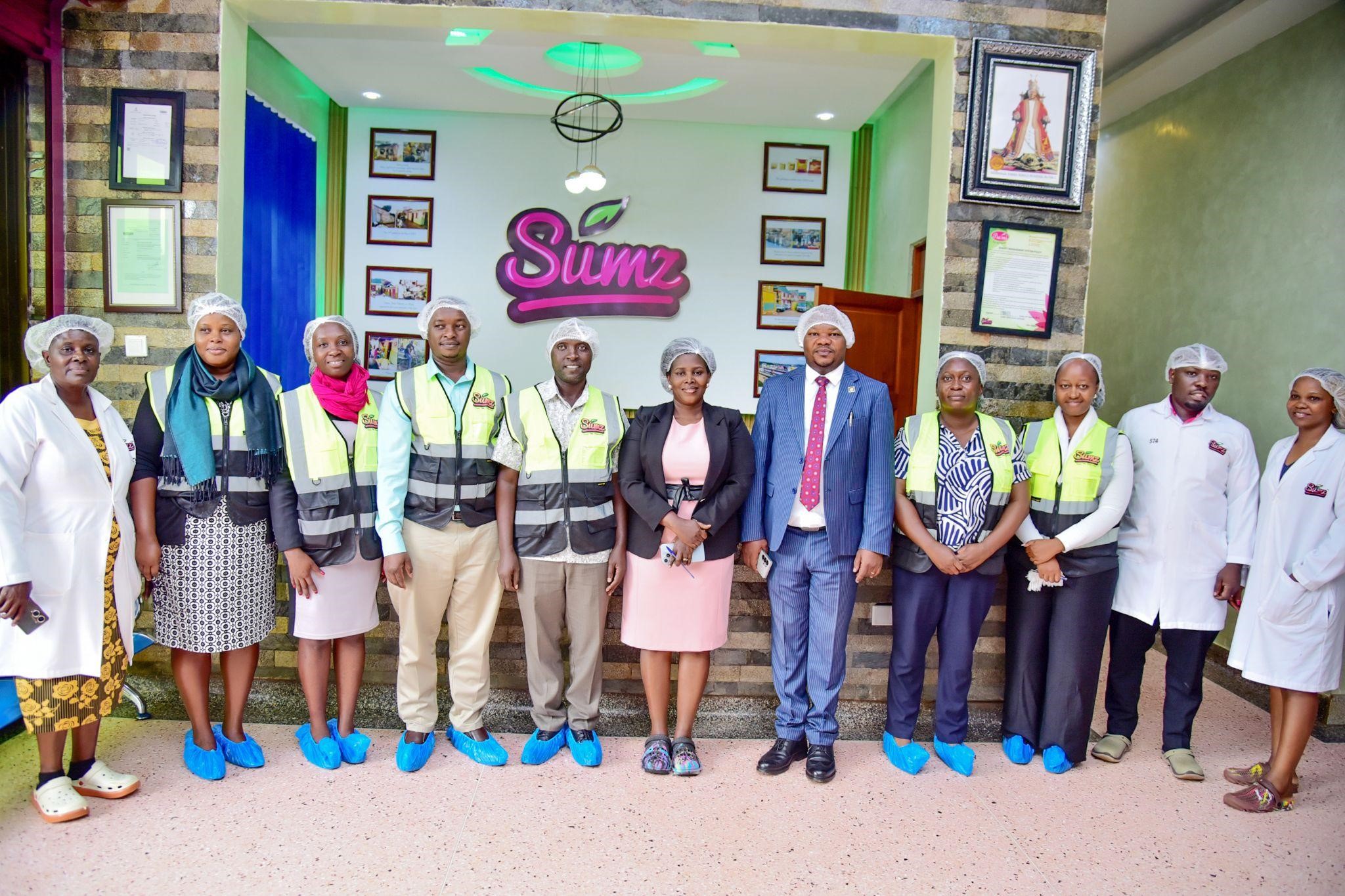
On 2nd March, 2026, representatives from the Advancement Office, the College of Business and Management Sciences and the University Innovation Pod visited Psalms Food Industries to discuss a prospective partnership aimed at strengthening university–industry collaboration in manufacturing, research, innovation, and skills development.
Psalms Food Industries, a homegrown snacks innovation and manufacturing company, operates three major brands, namely, Sumz, Afrikan Harvest and Krunchables, which have grown to a range of 37 products and target the introduction of five new products annually. The company distributes products across Kenya, Rwanda, the Democratic Republic of Congo, South Sudan, and, recently, Tanzania. As a labour of love, the idea of producing snacks was born during the honeymoon of Mr and Mrs Ngabirano, who now run Psalms Food Industries side by side.
Dr. Denis Ngabirano, CEO and Co-Founder of Psalms Food Industries, during the meeting, described the company as “a snacks innovation house, with all our products developed in-house.” He noted.
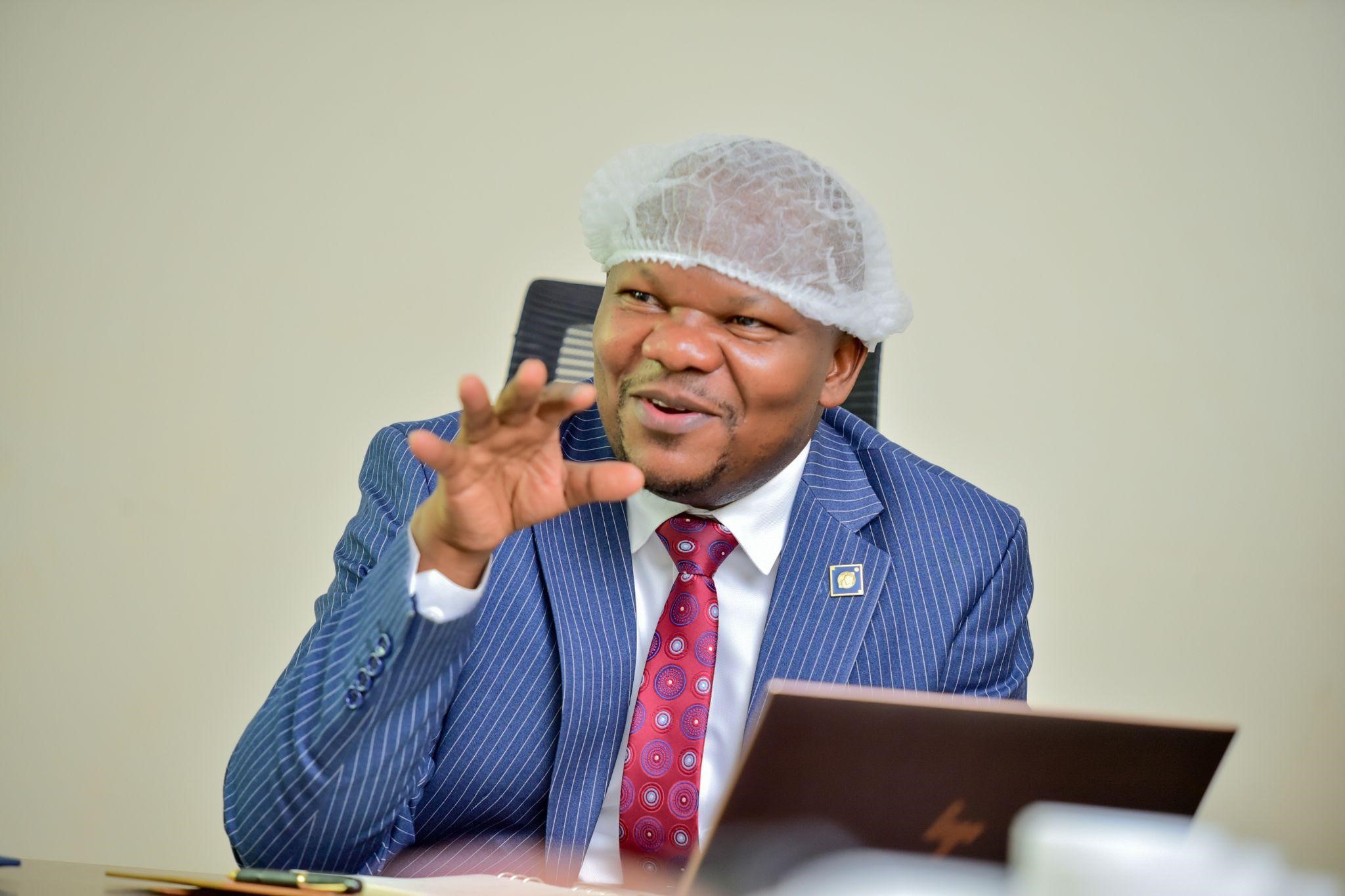
He emphasised the company’s commitment to quality assurance and consumer-centred research, noting that Psalms conducts surveys and gathers customer feedback to inform product development, supported by an internal microbiology and chemistry laboratory.
Dr. Denis Ngabirano noted that the company had only recently introduced two brands, “Afrikan Harvest for it’s health conscious clientele and Kruchables for it’s volume centric clientele.
“Afrikan Harvest has no additives, it is a brand for health-focused consumers,” he explained, while highlighting the differentiated positioning of their product lines. “Sumz is our premium brand, and Krunchables focuses on volume.”
Student-Centered Experiential Learning
A key focus of the meeting was structured experiential learning for students across disciplines. Potential areas of collaboration include internships, graduate trainee pathways, and hands-on exposure within Psalms’ incubation and production facilities.
The proposed engagement spans multiple fields, including environmental sciences, engineering, procurement and logistics, finance and accounting, quality control, production and manufacturing, human resource management, marketing, and international business.
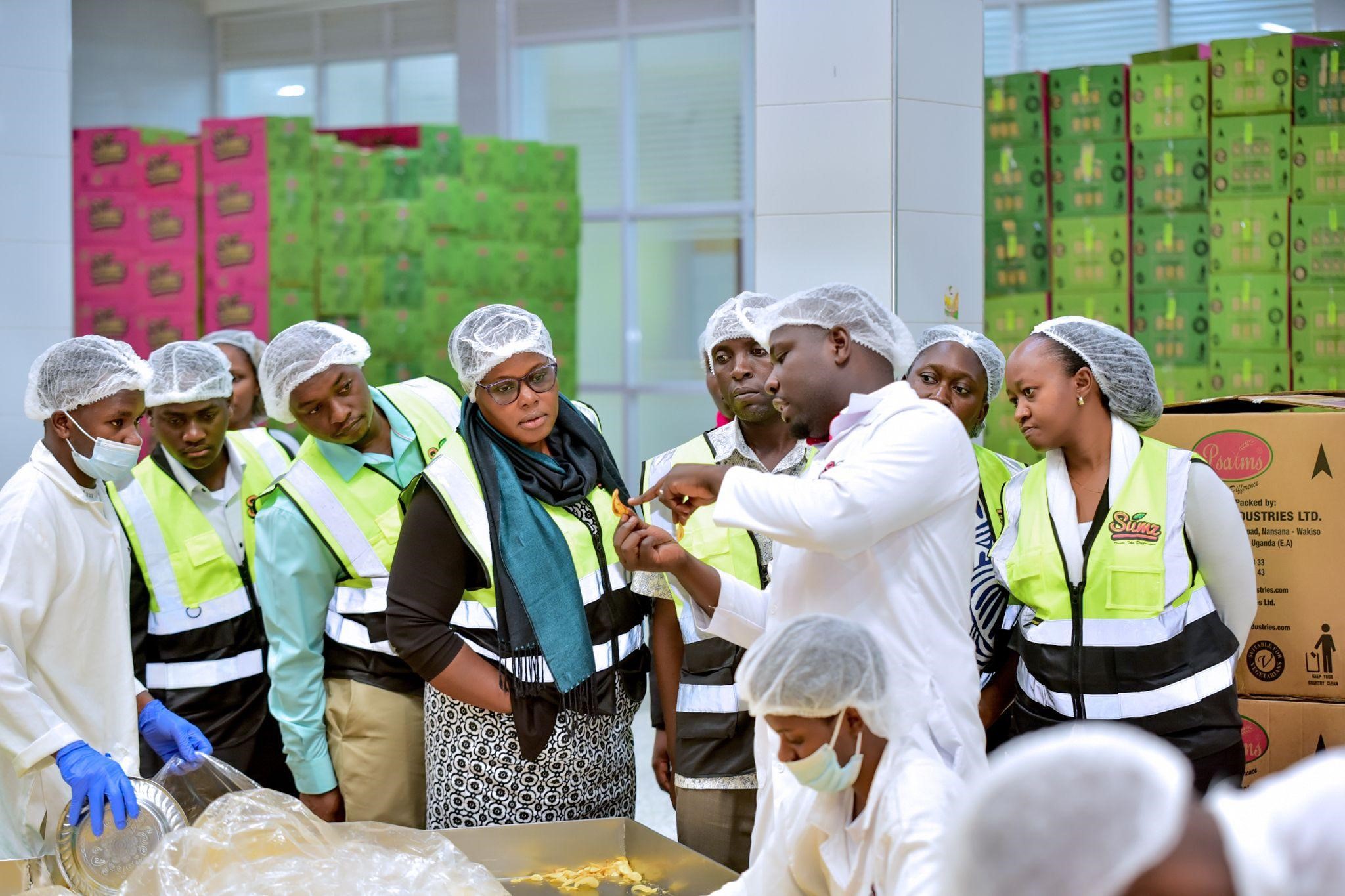
The partnership could provide students with direct exposure to real-time production systems, standard operating procedures (SOPs), and quality assurance frameworks, strengthening the practical relevance of their academic training.
Among the innovative ideas discussed was a potential competition involving students from the Fine Art and Industrial Design disciplines to redesign packaging for selected Sumz products. The proposal would allow top designs to be commercially adopted, creating a direct bridge between creativity, intellectual property development, and industrial application.
Research, Innovation and Commercialisation
Both institutions expressed interest in joint applied research initiatives, particularly in process optimisation, data analytics for manufacturing efficiency, product improvement, and sustainable production systems.
Opportunities were also discussed around collaborative research in machine design, crop development for snack processing, and factory energy solutions, areas that not only benefit Psalms but have broader implications for Uganda’s manufacturing sector.
The engagement further highlighted potential linkages with the University’s innovation and commercialisation structures, including the University Innovation Pod (UNIPOD), to support co-creation and scaling of student-led innovations.
Mr Awel Uwihanganye, Chief Advancement Officer at Makerere University, proposed strengthening the engagement through structured programming, including a planned collaboration between the University’s innovation Hub and the upcoming incubation Hub at Psalms Food Industries, particularly to support the commercialisation of research outcomes for both students and staff.
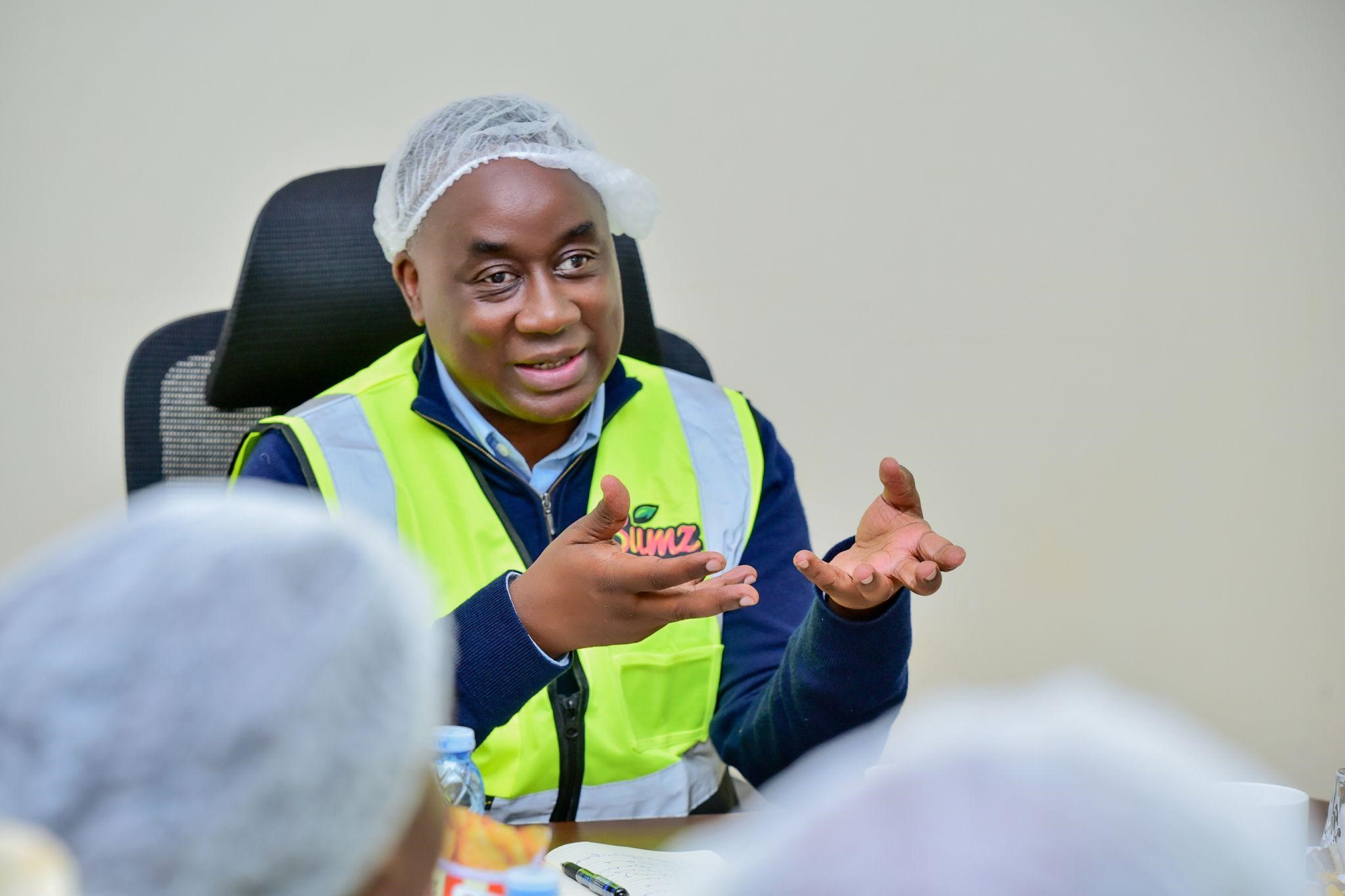
Curriculum Co-Creation and Staff Exchange
Beyond student placements, discussions also focused on co-developing academic content that responds more directly to industry needs, particularly within the manufacturing value chain.
Proposals included guest lectures by industry practitioners, staff exchange programmes to expose academic staff to factory operations, and tailored short courses for Psalms staff based on identified skills gaps.
Dr. Jude Mugarura, Head of the Department of Marketing and Management at COBAMS, emphasised the importance of embedding the partnership within academic programming. He proposed “internships for students in HR, marketing, international business, accounting and finance,” as well as staff exchanges to give University staff hands-on exposure to manufacturing operations.
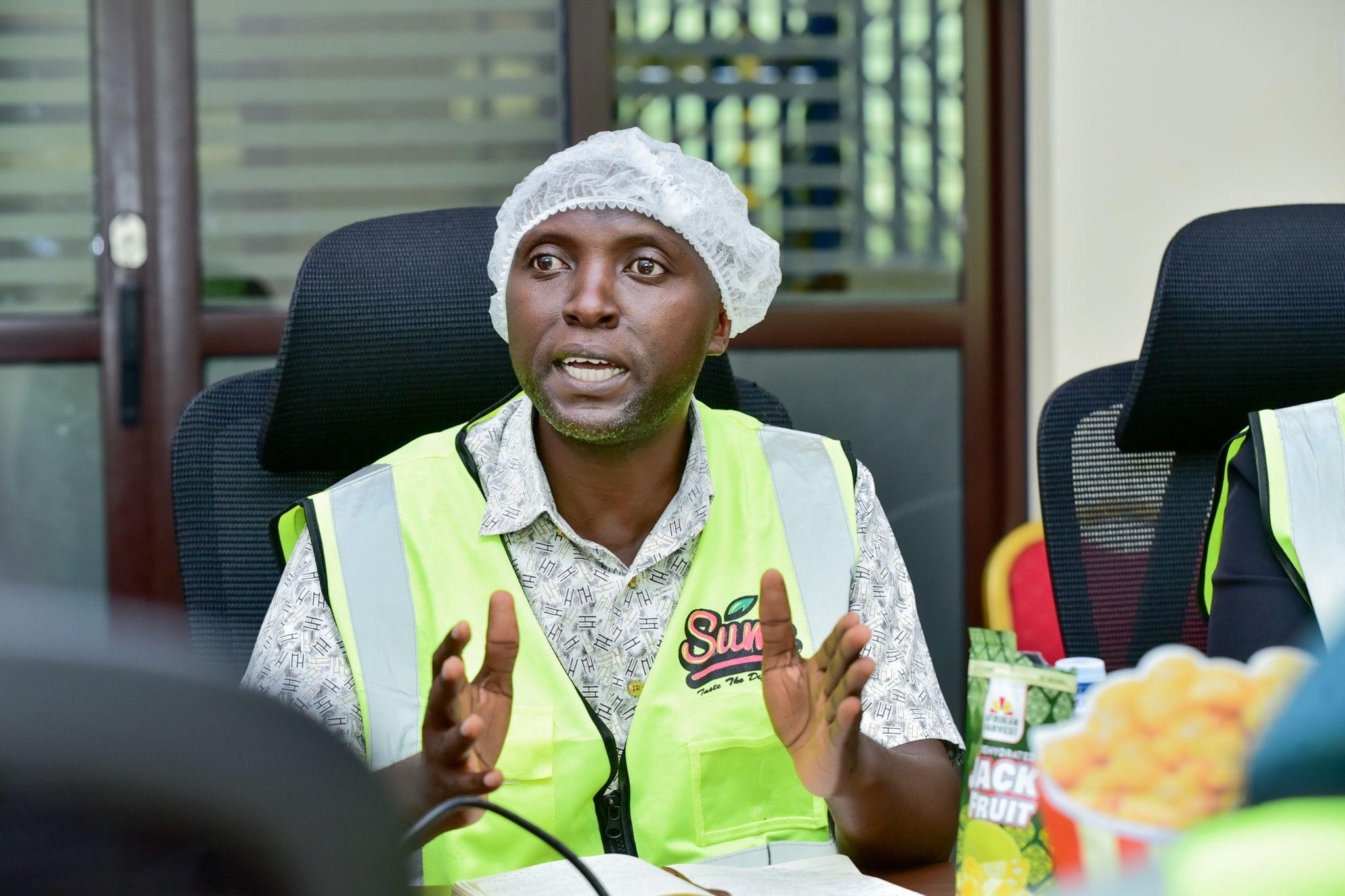
He further suggested specialised courses tailored to the factory’s needs and attachment of research students interested in manufacturing. Such collaboration would contribute to curriculum responsiveness and ensure that graduates are equipped with market-relevant competencies.
Strengthening University–Industry Linkages
The engagement reflects Makerere University’s continued commitment to strengthening partnerships that bridge knowledge generation and real-sector application.
Both institutions expressed a shared vision of building a structured, mutually beneficial collaboration that integrates research, innovation, skills development, and enterprise growth, positioning the University as a key knowledge partner in Uganda’s manufacturing transformation.
Discussions remain ongoing as both parties refine priority areas for formalisation.
Caroline Kainomugisha is the Communications Officer, Advancement Office.
General
Makerere University commemorates 13 transformative years of partnership with Mastercard Foundation
Published
2 days agoon
March 2, 2026
On Friday, 27th February 2026, Makerere University proudly celebrated 13 years of a significant partnership with the Mastercard Foundation, a prestigious independent organisation headquartered in Toronto, Canada. Since its inception in 2013 with the launch of the Scholars Program-currently headed by Prof. Justine Namaalwa, this collaboration has grown significantly, expanding to include two additional initiatives: The E-learning Initiative-headed by Prof. Paul Muyinda Birevu and the Africa Climate Collaborative-headed by Prof. Gorretie Nabanoga. This long-term partnership underscores the shared commitment to fostering education, innovation, and sustainability in Uganda and across Africa.
The colourful event coincided with the 76th Graduation Ceremony, during which Makerere University honoured Ms. Reeta Roy, the Founding President and CEO of the Mastercard Foundation, with an honorary Doctor of Laws.

In her commencement speech, Ms. Roy thanked Makerere University for considering a partnership with the Mastercard Foundation and for conferring upon her a prestigious honorary award.
“Mastercard Foundation is honoured to collaborate with this esteemed university, and I appreciate the recognition through this award. I am excited to be associated with Makerere University and look forward to actively embodying its values. Joining the broader community of alumni from this distinguished institution is a privilege, and I am eager to contribute to its legacy,” stated Ms. Roy.

During the reception in honour of Ms. Roy, the Chairperson of Makerere University Council, Dr. Lorna Magara, acknowledged the invaluable support from the Mastercard Foundation. She emphasised the profound impact of the Foundation’s various initiatives, particularly the scholarships for disadvantaged youth, which enable them to access higher education and opportunities that might have otherwise been beyond their reach.
“On behalf of the Makerere University Council and the broader University community, I extend our sincere gratitude to Mastercard Foundation for its commitment to collaborating with Makerere University in various endeavours, especially for providing scholarships to our underprivileged young people who would never have stepped inside a lecture room at the University.” Dr. Magara stated.

Dr. Magara, in a special way, thanked Ms. Roy for her transformative leadership and unwavering commitment to supporting young people in Africa, citing her efforts to ensure young people get their voices heard.
“As a university, our business is with young people. We are therefore committed to providing the environment and education that deliver meaningful pathways. We will provide an environment that ensures young people have a voice and agency to create meaningful change in society.” Dr. Magara pledged.

Dr. Magara further congratulated Ms. Roy on her honorary Doctor of Laws from Makerere University, noting that it is the university’s highest honour for individuals who have excelled in their careers.
“On behalf of the Makerere University community, I would like to extend my heartfelt congratulations on your honorary Doctor of Laws. This esteemed recognition represents the highest honour our institution can bestow on individuals who have demonstrated exceptional achievement and excellence across various facets of their career.” Dr. Magara remarked.
Prof. Justine Namaalwa, the Program Director of the Mastercard Foundation Scholars Program and the Coordinator for all Mastercard Foundation Initiatives at Makerere University, expressed her appreciation for the thirteen-year collaboration between Makerere University and the Mastercard Foundation. She highlighted that the partnership had yielded significant, impactful results.

“In 2013, Makerere University partnered with the Mastercard Foundation to educate the next generation of transformative African leaders who can positively impact their lives, their communities, and the economies of Africa. The partnership has had a significant impact. I thank the University Management and the Foundation team for this visionary collaboration,” remarked Prof. Namaalwa.
Prof. Namaalwa articulated that the partnership with the Mastercard Foundation is primarily focused on empowering young people as agents of change for transformational leadership in Africa. She presented compelling statistics demonstrating the positive impact of the scholars’ program, highlighting the success of individuals who have completed their education and their subsequent professional experiences after university graduation.

“This partnership focuses on young people, aiming to create positive change in their lives. To date, the Scholars Program has graduated 974 alumni, with 48% securing formal employment, 18% starting their own businesses, 8% participating in internships, and 5% pursuing further education. Overall, 72% of Scholar alumni are actively engaged in employment or entrepreneurship,” Prof. Namaalwa stated.
The colourful event showcased a dynamic array of activities that highlighted the entrepreneurial spirit of Scholars and alumni from the Mastercard Foundation at Makerere University. Attendees enjoyed a mini-exhibition featuring innovative products from these ventures.

A video documentary illustrated the positive impact of the three Mastercard Foundation initiatives. The event also featured inspiring poetry recitations by Scholars and a lively atmosphere of music and dance, creating an engaging and memorable experience for all participants.
The high-level event was attended by senior University officials, led by the Chairperson of Council, Dr. Lorna Magara; the Vice-Chancellor, Prof. Barnabas Nawangwe; the Vice-Chancellor, Academic Affairs, Prof. Sarah Ssali, Deputy, and the Ag. Deputy Vice-Chancellor, Finance and Administration Prof. Winston Tumps Ireeta. Mr Yusuf Kiranda, the University Secretary; and Prof. Buyinza Mukadasi, the Academic Registrar, Chancellor Emeritus-Prof. Ezra Suruma, former Chairperson of the Steering Committee of Mastercard Foundation Scholars Program-Prof. Umar Kakumba, and the Deputy Executive Secretary, RUFORUM, and former Program Coordinator of the Scholars Program at Makerere University-Dr. Florence Nakayiwa, among many other officials graced the function.

The event was also graced by a high-level delegation from the Mastercard Foundation, led by Ms. Reeta Roy, the Founding President of the Foundation, and included the Mastercard Foundation Teams from the Country offices in Kigali, Nairobi, and Kampala; the Program partners; the Mentors, Scholars and alumni; as well as the Program staff of the three Mastercard Foundation Initiatives at Makerere University.
At the end of the event, Makerere University honoured Ms. Reeta Roy with University memorabilia, including a pencil-drawn portrait, a pencil-drawn photo of the Ivory Tower, and other Ugandan crafts. Ms. Roy cut a graduation cake together with the 10 graduates of the 76th graduation ceremony from the Mastercard Foundation Scholars Program.
Bernard Buteera is the Principal Public Relations Officer for the Mastercard Foundation Scholars Program at Makerere University.

It is with great pleasure that I welcome you to this edition of Mak News Magazine, a publication that continues to chronicle Makerere University’s journey as a centre of academic excellence, innovation, and societal transformation.
The stories featured in this issue vividly demonstrate Makerere’s unwavering commitment to addressing national, regional, and global challenges through research, partnerships, and people-centred solutions. They reflect a university that is deeply engaged with society, one that applies knowledge not only to advance scholarship, but also to improve lives.
A recurring theme in this edition is innovation for resilience and inclusion. From the College of Agricultural and Environmental Sciences’ Healthy Soy Initiative combating child malnutrition amid climate change, to the cutting-edge work of CEDAT’s Team Green Minds integrating IoT into agriculture, Makerere continues to harness science and technology to respond to pressing development needs. Equally inspiring is the College of Natural Sciences’ success in securing international funding to scale up fish processing technologies, with a deliberate focus on empowering women and strengthening livelihoods.
This issue also highlights Makerere’s growing role in advancing health and wellbeing. The launch of the Early Intervention Psychiatry Services Clinic at Makerere University Hospital marks an important step in strengthening mental health services, while the Hospital’s transformation from a modest sickbay into a centre of excellence stands as a testament to decades of strategic investment, dedication, and service to the nation.
Our commitment to education access and global engagement is equally evident. Strategic partnerships, such as that between the College of Education and External Studies and the Uganda Vocational and Technical Assessment Board, are expanding pathways to quality education. The establishment of the first-ever United States Studies Centre in the Great Lakes Region positions Makerere as a hub for dialogue, research, and policy engagement on global affairs. We also celebrate our vibrant international community, with graduates drawn from 67 nationalities—affirming Makerere’s status as a truly global university.
This edition further showcases initiatives that ensure long-term institutional sustainability, including the launch of the CoCIS Endowment Fund, infrastructure developments such as the modern hostel at Buyana Farm, and transformative programmes supported by the Mastercard Foundation that continue to empower young people across the continent.
As you read through these pages, I invite you to reflect on the collective effort of our students, staff, alumni, partners, and supporters whose contributions make these achievements possible. Together, we continue to shape Makerere University as a place where knowledge serves humanity.
I wish you an engaging and inspiring read.
Prof. Barnabas Nawangwe
VICE CHANCELLOR
Trending
-

 Humanities & Social Sciences1 week ago
Humanities & Social Sciences1 week agoMeet Najjuka Whitney, The Girl Who Missed Law and Found Her Voice
-

 General1 week ago
General1 week ago76th Graduation Highlights
-

 Health2 weeks ago
Health2 weeks agoUganda has until 2030 to end Open Defecation as Ntaro’s PhD Examines Kabale’s Progress
-

 Agriculture & Environment2 weeks ago
Agriculture & Environment2 weeks agoUganda Martyrs Namugongo Students Turn Organic Waste into Soap in an Innovative School Project on Sustainable Waste Management
-

 Health2 weeks ago
Health2 weeks agoMakerere University School of Public Health Graduates First Cohort of Cost-Effectiveness Analysis Short Course
